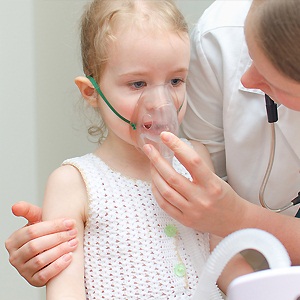
About 15 percent of more than 300 children treated for respiratory illness in Missouri have ended up in an intensive care unit, according to a health alert from the Missouri Department of Health and Senior Services.
Children's Hospital Colorado reports that 86 kids have been hospitalised out of more than 900 treated for severe respiratory illness since Aug. 18.
Public health officials fear the beginning of the new school year could allow the virus to gain momentum.
The number of hospitalisations reported so far could be "just the tip of the iceberg in terms of severe cases," Mark Pallansch, director of the U.S. Centers for Disease Control and Prevention's Division of Viral Diseases, told CNN.
Image: Map of current infected states, from CNN
The virus has not been officially identified.
But health officials suspect that it's a rare respiratory virus known as Enterovirus D68, or EV-D68, that's part of the family of viruses that includes the common cold.
Missouri health officials reported that 19 of 22 specimens examined at a CDC lab tested positive for EV-D68.
Read: Enterovirus infection could lead to Type 1 Diabetes
Children infected with this virus will appear to have a severe cold, with runny nose, sneezing and cough, according to Children's Hospital Colorado. But the illness can escalate quickly in some cases, and the child may start to have trouble breathing.
Missouri, Colorado, Georgia, Illinois, Iowa, Kansas, Kentucky, North Carolina, Ohio and Oklahoma have sent samples to the CDC for analysis, according to news reports.
Antibiotics won't work against a virus, and there is no antiviral treatment available for EV-D68, public health officials said.
Children's Mercy Hospital in Kansas City, Mo., began seeing an increase in paediatric respiratory cases in mid-August, said Dr. Mary Anne Jackson, the hospital's division director for infectious diseases.
"We saw an unusually high number of children with respiratory viral disease that appeared to trigger asthma attacks," Jackson said.
About a third of the kids who suffered an asthma attack from the disease had never experienced asthma before, she said.
Since then, Children's Mercy has treated 498 children for respiratory infection, with most admitted to the hospital. Of those, 61 have ended up in the intensive care unit, Jackson said.
Despite these numbers, Jackson said hospital officials believe most children are going to wind up with a common cold as a result of the virus, and even those with more severe symptoms will recover.
Read: Is it a cold or is it the flu? How to tell.
"The vast majority of kids we saw stabilised within 24 hours," she said. "The average kid goes home in four or five days. That's not a short hospitalisation, but they are going home."
EV-D68 has been confirmed in most patients, but not all, Jackson said. It appears other respiratory illnesses are also going around, complicating efforts to identify and treat this specific virus.
How to prevent infection
Good hygiene is the best defense against a child catching the EV-D68 virus, said Dr. Len Horovitz, a pulmonary specialist at Lenox Hill Hospital in New York City.
"Hand washing is paramount, and teaching kids not to touch their faces with unwashed hands is the point," Horovitz said.
Watch: CNN's Elizabeth Cohen explain how the virus spreads
"Any child or adult with flu-like symptoms or common cold symptoms should be seen, evaluated and followed by doctors for any respiratory complications."
Quick look: Cold, flu, sinusitis and hayfever symptoms at a glance
Children and adults should wash their hands with soap and water for at least 20 seconds on a regular basis. They also should avoid contact with people who are sick, and stay home if they themselves fall ill.
Kids with asthma need to stay on top of their symptoms and take their medication, public health officials said.
"Children with an underlying history of asthma are especially at risk for significant illness which may require hospitalisation," said Dr. Roya Samuels, a pediatrician at the Steven & Alexandra Cohen Children's Medical Center in New Hyde Park, N.Y.
Enteroviruses are very common, according to the CDC. There are more than 100 types of enteroviruses, and they cause about 10 million to 15 million infections in the United States each year.
People who come down with a bad summer cold often have been laid low by an enterovirus, the federal agency said.
EV-D68 was first identified in the 1960s, Samuels said, but up to now there have been fewer than 100 reported cases.
"Enterovirus usually presents itself as a mild cold or diarrhoeal illness," Samuels said. "It is unclear as to why infected children [now] are presenting with severe upper respiratory infection symptoms."
Read more:
Natural relief for a spring or summer cold
See if there's flu near you
Climate change brings increased respitory infections




 Publications
Publications
 Partners
Partners















